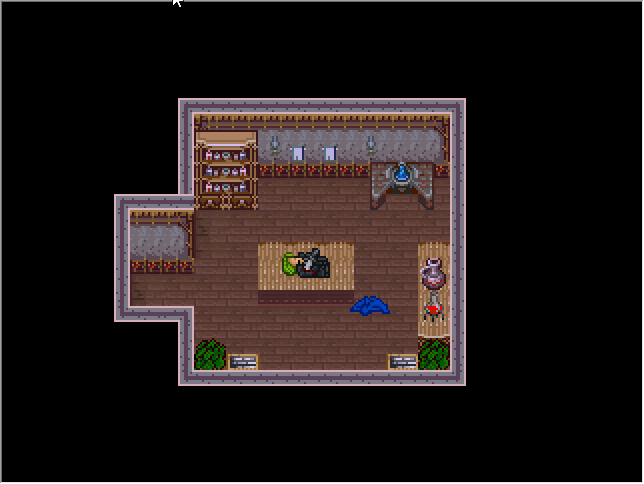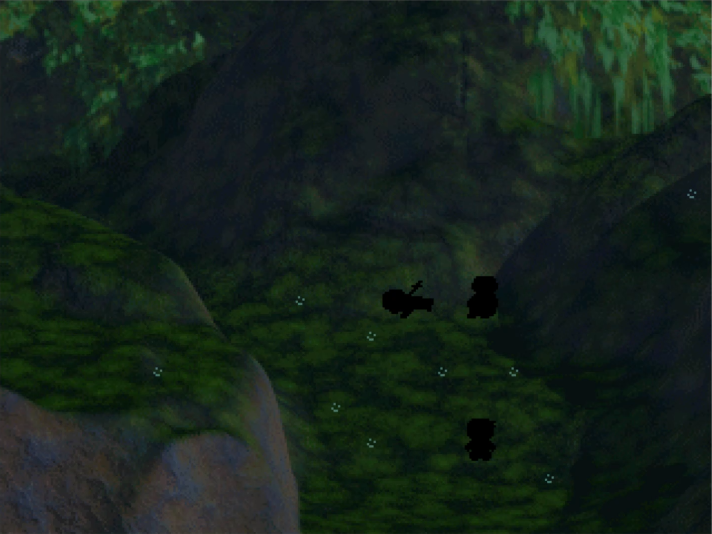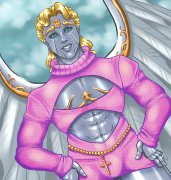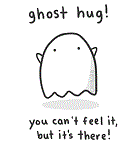|
GunnerJ posted:By the way, what's the track that plays as Rhue is talking to Lexus, the one with the weird warbling feedback and poo poo? Tower. Original track by Lun. It plays in all three endings and in the tower itself.
|
|
|
|

|
| # ? May 9, 2024 00:07 |
|
Lun's Play Magazine Interview. Interview: Luke Wacholtz Words: Kyle B. Stiff Date: 18th May 2009 Format(s): Interview Long before casual gamers dismissed the current indie gaming scene, they dismissed another independent gaming scene: homemade RPGs. Produced by individuals or small teams on software of questionable legality, advertised by word of mouth, and distributed through online forums, these games pick up the creative and emotional slack that was dropped by studios. Like many gamers, I felt something come awake inside my soul when I played Final Fantasy IV and VI, and mistakenly assumed that the future of gaming would see an increase in emotional complexity. I thought that the medium would grow up with me. It did not. Creativity was derailed. The emotional center of gaming did not hold. I was disappointed - but I wasn’t alone. In the mid 90s or thereabouts, RPG making programs started popping up on the internet. In theory, anyone could learn how to use these tools and make their own RPG. Fortunately, a few heroes did... and still do. Many of these homemade RPGs lack polish, but some brave titles contain a level of artistry long unseen in the creative vacuum of “establishment” gaming. One controversial title, The Way created by Luke Wacholtz, not only stood out as an underground great but, more importantly, became one of my favorite games of all time. Wacholtz, better known by his alias Lun Calsari, spent three and a half years on the six episodes that make up his magnum opus, The Way. Greater minds than me have tried to describe The Way. It’s like a fantasy world penned by Jodorowsky or David Lynch, or a dream painted with pixels, or a message from the distant future made with the tools left over from our apocalypse and sent back to us, neither warning nor greeting. An experience far beyond the norm. Many underground RPGs are made by teams of people, and while Wacholtz was given some songs, character portraits, and animated sprites by other gaming enthusiasts, The Way is mostly the work of Wacholtz alone, a veritable “Howard Roark” of independent game creation. I cornered and questioned him about his experiences with the indie gaming scene, his thoughts on The Way, on making complicated protagonists like Rhue, and the controversy surrounding the release of the final episode of The Way. Kyle B. Stiff: Were you familiar with the RPG Maker community before you started down the path of game creation? If so, what did you think of the community? If not, was there a rude awakening when you released some of your early games? Luke Wacholtz: I discovered RPG Maker 95 (RM95) and the Rpg Maker Community in 1998. RM95 was like something out of a dream. The community around it was composed mostly of hardcore RPG addicts who had long fantasized about creating their own game. There was a lot of excitement and even RPG Maker games that would come off as old and hackneyed today had something of a brand new feel. When I was first starting out, I held a mild reverence for the regulars. Some people came off a bit pretentious, but it was good fun as far as I was concerned. And while I was very familiar with the RPG Maker community, no one was really familiar with me because I was just a lurker on the boards, though I did review a few games that I liked. If I commented on the boards, it was mostly just to compliment someone on something I thought they did well in their game. Still, it wasn't until I released Crestfallen: Inception that the name Lun Calsari meant anything to anybody. And even then, I'm not saying it meant a lot. There was no rude awakening upon releasing my first game. Crestfallen: Inception met instant acclaim. The mini-games and puzzles pushed RM95 beyond what many had thought were the program's limits. One thing that set Crestfallen: Inception apart were the elaborate cut scenes. Some reviewers even noted that several of these were just as if not more impressive than many professional RPGs of the near past. One reviewer even gave the game a 100% score which sparked a large controversy in the tiny RM community. The RPG Maker community really began to grow with the release of RM2K [RPG Maker 2000]. Mega sites like Gaming Ground Zero, Gaming World, and Rpg2knet were soon larger and more active than any of the sites I frequented in 1998. I have no hard statistics, but I would wager from my experiences that the average age of the community began to drop. There were more barely playable, unfinished games than before, but there were more good games also. Overall, the talent pool of the community seemed to increase tremendously. During the summer of 2000 I began work on The Way. The first episode was officially released in early 2002. By that time I was well into making Episode 4. Episode 1 was generally well received despite some of its shortcomings, and a few people even remembered my name from the RM95 days. I think the main thing that got people to initially give the game a try were the 3D rendered backgrounds. It immediately set the game apart from everything else on the scene. Kyle B. Stiff: I gotta admit that, while I'm not a graphics whore, it was the 3D backgrounds that sold me on downloading The Way. The introductory green grassland and blue sky "World 1 -1" look is incredibly inviting. Some of the arid, rocky areas later on, combined with the complete breakdown of the characters' psyches and relationships, create a very intense atmosphere of tragedy. You mentioned the instant acclaim factor, so now I have to bring up the controversy surrounding Episode 6, the end of The Way. You were breaking from cliche all The Way through, the game-making scene people loved it, then you ended the tale in such a way that completely divided the community. I have the feeling that people wanted something "epic," they wanted to see evil rulers toppled and rightful rulers put in place, but instead they got this deeply personal ending. You know, the ending reminded me of someone dealing with a personal encounter with senseless violence, like surviving a school shooting or something like that. What were some of the reactions you got from this final chapter? Luke Wacholtz: Ok, this next part will definitely warrant a spoiler alert. Yes, Episode 6 was somewhat controversial. The stage, Dream Estrana, is a complex, interconnected wonderland of secrets and mysteries. In fact, the amount of optional material is probably greater than the material encountered along the direct route to the end. So if you just play through the game along the logical route, you will miss out on a whole lot as many players did. Concerning your thought about the deeply personal ending: Everybody experiences tragedy in their life, and E6 was created during one such trying time for me. I think that some parts definitely reflect this, and the game is better for it. It seemed to me that a lot of the people who thought the end of Episode 6 was pretty good were somewhat casual players. It felt like regulars, people who had spent considerable time on my website discussing and debating various theories for a year or more, had already figured out roughly what was to transpire and so most of them did not get the same thrill a casual player would; they merely got confirmation on some of their theories. Unfortunately, Episode 6 was the last game, and they quickly realized that all their other painstakingly mapped out theories concerning other mysteries (that a casual player may not have even considered important) would not be confirmed or denied in the same manner. When you put so much effort into something, you want a return on it. You want to know if you are wrong or if you're right. You want to understand. That's how I am, so I can sympathize with players who might have felt disappointed or even angry at the end of Episode 6. At the same time, the fans on my message boards have produced a startling number of strong theories to explain a lot of the mysteries that might have puzzled most players at the end of Episode 6. In some cases the evidence is largely conclusive, and it is all based on clues provided during the course of the game. Not every mystery can be solved, but perhaps more than one might think. Anyone who has finished Episode 6 and is still confused should definitely pay a visit to the Post-Episode 6 Discussion message board Also, before a person blasts The Way for leaving some issues unresolved, it might be good to understand one of the dilemmas I faced. When you create a world like The Way, it can be very difficult to filter out certain parts of it without compromising the world itself. If you refuse to expose players to certain objects or ideas because you know you will probably not be able to fully explore them, your world loses something. As a creator, you want to show off your world in all its glory, so sometimes you allow in certain things that never reach their full potential, that is, things that are never fully realized or explained even though they contribute to the realization of the world itself. In The Way, the Citadels might be one example. This concept applies to a few of the characters as well. Yes, they had a part to play in Rhue's saga, but sometimes their story extended well beyond "Rhue" into the future, the past, or both directions. I suppose my feeling was that certain details shouldn't be forced. So I decided to leave further exploration to later works that I hoped (and still hope) to create. One such work exists even now. After the RM2K series was finished I went on to write a second story based in The Way universe. It amounts to what would probably be a 160 page graphic novel. Unfortunately, some parts of the story might not make much sense without knowledge gained through the six episodes of the RM2K series. On the whole, however, I think it is probably easier to follow than Rhue's saga. I think you are correct in the feeling that most people wanted something more epic. Many surely felt that the game shouldn't have ended where it did. So maybe an explanation is warranted... Rhue's story is the central story of the game. Yes, I know the game is not called "The Rhue" (which would be silly), but that's the fact of the matter. And if you think about it, you realize that players get to experience the entirety of his existence. They are there right after his "birth" at the beginning of Episode 1 (though most are not aware of this) and they are there for his "death" (the realization of his true nature) in Episode 6. To put it more plainly, as soon as the truth about Jeruh and Serena is realized, "Rhue" dies, even as the newly enlightened persona continues living. So in my view it is very natural that the game should start and end where it does. There is birth, then life, then death. Kyle B. Stiff: But do you think there's a certain "throw away" factor that a lot of mainstream RPGs have that just shouldn't be applied to The Way? What I mean is, when we encounter a mystery, it's natural to want to solve that mystery. To tear the veil away from it. You mention the existence of the Citadels, these great monoliths of mystery. Of course we all wanted to get into one of them, but I think it showed great restraint on your part when you kept the player away from them; otherwise we're going to have this deflated feeling of, "Oh... so that's what they were." Or the everpresent, moving fog that covers the beginning and end of The Way, which keeps wanderers on the move and makes settling down seem like a perversion. What is it? No explanation is given. I can't help but think that a less skilled storyteller would have created a world of mystery at the beginning and destroyed it at the end; it's natural to give the crowd what they think they want, rather than what they really want. At the risk of sounding arrogant, do you think that what the player perceived as being short-changed might actually be them short-changing you as a storyteller? Luke Wacholtz: As far as any "throw away" factor goes, I will just say that different people have different expectations. If someone wants all the mysteries resolved and every loose end tied up, if that's what they like, then they are welcome to it. The Way has been both flamed and praised, and that's merely a function of the differing tastes that exist in the world. I am fine with this. The world is interesting because of all the differences. At the same time, it is very exciting to me that a lot of people have responded positively to The Way. Like many other people, I was trying to make the game that I always wanted to play. A connection of sorts exists when you enjoy the same thing some else enjoys. And this connection, the feeling, is even stronger when you are the creator of this thing. In the past, when I've felt short-changed as an audience member, it was usually because I felt the storyteller cheated in some way. I remember someone referring to the ending of Episode Six and what they said was something like, "This couldn't have been more of a Stephen King ending if a giant glowing hand had appeared out of nowhere and saved the day." The wit of the comment was nice, but they didn't explain at all where I had cheated them (though I could probably guess). The Way isn't perfect, but I don't think it is ever giant-glowing-hand bad. So to answer the question more directly, there are times when I have felt that certain aspects of The Way were perhaps under-appreciated, but if a player feels short-changed by the end, if I've lost them, then I'm not going to be standing around complaining about how they short-changed me. I'll be more concerned about why they felt short-changed. And if their criticism rings true, then I'm going to do what I can to learn from it and improve. This may mean making big changes if its really sticks in my gut. Given that some of the mysteries of The Way are fairly complex, I encourage players who feel short-changed to read and post on my message boards. For many, this is all it takes. Where they feel I might have cheated, I might have just been very subtle. But if a person still feels short-changed after a thorough perusal, then maybe I did cheat, or maybe I just failed to connect with them. Kyle B. Stiff: I have to ask about Rhue. He doesn't like to be boxed in by easy descriptions. You could say he's a good guy because he's on a quest to rescue or find a long-lost childhood friend; you could say he's a bad guy because he's willing to commit almost any immoral act against anyone who stands in his way. I've sometimes thought of The Way as a redemption story for Rhue, but that's tricky too because it's not obvious that there's any light at the end of the long, dark tunnel that Rhue descends. We're culturally prepared for someone like Cecil of Final Fantasy IV who starts out as a Dark Knight but later emerges as a Paladin, whereas it would be disconcerting if Cecil confronted his mirror-self and found only more and more darkness along with understanding. What went into developing Rhue's character? How has he been received? Luke Wacholtz: I desperately try to avoid making inherently good or bad characters. When I am figuring out what a character would do, I rely on their background, motivations, and quirks for guidance. As such, there isn't a lot of black and white in The Way. It isn't Harry Potter (which is very well done) where you have the good guys on one side and the bad guys on the other. It's mostly shades of gray, which I personally find more interesting. So Rhue makes many decisions, most of which are neither clearly good or evil. There is a lot of room for argument, and a person may learn something about themselves by noting which side of the argument they end up on. I have seen many debates where people disagree over whether Rhue was justified in certain courses of action. Rhue's character is largely about the obsessive pursuit of an unattainable ideal. In his specific case, the ideal is the girl he loved long ago. The perfect person. In my teens I watched friends and acquaintances fall in and out of "love" repeatedly. A girl I worked with would often say to me, "I just need to find the right person." One day I turned it around on her (and maybe this was a bit sanctimonious of me) and said, "Maybe you should stop looking for the right person, and start trying to be the right person." Slightly offended, she looked right at me and said, "I am the right person." And yeah, there was probably a double meaning there, but who knows. The key difference between our two perspectives was this: She was largely looking for love to just happen, and I was saying, "You got to work at it." I was in high school when I discarded the notion that there was one right person out there. Don't think I'm a pessimist. After moving from place to place (6 or 7 times) during my childhood I found there was always someone new to fall for. I just didn't buy that somewhere out there a single chosen one existed. I believed a person could choose whoever. Depending how you look at it, that may be more or less romantic than the idea of destiny bringing two people together. So to me, love was a choice you made, not just a feeling; it was something you had to strive for and actively create over the long run. Loyalty, sacrifice, and empathy were key elements among others. The first two elements really played into Rhue's character. As far as Serena goes, Rhue is a shining beacon of loyalty and sacrifice. He leaves his family far behind and he searches ceaselessly despite years and years of disappointment whereas most people would have given up long ago and moved on. Can you imagine someone doing that for you? I think initially most players are drawn to Rhue, and maybe even admire him, because of this absolute commitment. The level of loyalty and sacrifice present in his character seem to be near ideal. So when Rhue resorts to violence, I think most people look at the situation and feel inclined to give him the benefit of the doubt. But at the end of the day, Rhue is an extremist with a Machiavellian end-justifies-the-means philosophy, and so he is dangerous (at least to my mind). Many players even come to believe that he is psychotic, which is certainly arguable. By the end of the game, Serena, the ideal love, Rhue's supposed soul mate, is vanquished, and Rhue is confronted by the Phantom Slasher who tells him that people aren't perfect and that no matter what they do they will fail him in some way. Rhue accepts this and tells the Phantom Slasher that he doesn't care. He just wants someone who will keep trying, and that he will keep trying too. The most obvious interpretation is that he wants someone who will choose to love him and continue working at it with him despite various challenges. All in all, player's reactions vary wildly: I have had players tell me that they hate Rhue. I have had players tell me that they love Rhue. I have had players tell me that they ARE Rhue. Some of these reactions probably relate to his other themes and levels of meaning. After all, hidden in the midst of his quest for Serena there is an existential quest of sorts. But that is an exploration of the deep and--maybe--meaningless, that might be better reserved for another time. Kyle B. Stiff: Any thoughts on the current independent gaming scene? Right now there are a ton of homemade RPGs being made, no money is exchanging hands, and these communities are coming together without any sort of commercial pressure at all. On the other hand, I feel like there's this idea out there, which we don't really talk about, that if something isn't in a box and sold in a store then it might as well not exist. What do you think? Luke Wacholtz: As for indie-game-non-existence-syndrome, I know people who have it, but its definitely curable. It just takes the right game, that one breakthrough title that exposes a person to the innovation and fun that can exist beyond the "box." I think the bottom line is, if a game is a lot of fun, then its going to get played and people are going to talk about it and spread the proverbial gospel. I'm not an expert on the current homemade RPG scene, but I think there are going to be some really great developers that emerge from that particular section of primordial sludge. The tools are getting easier and easier to use, and with each product the amount of customization that can be done increases. I remember feeling restrained by the tools back in 2000, but now I feel like just about anything is possible. NOTE FROM FLESHWIT: Kyle B. Stiff is a huge idiot. Fleshwit fucked around with this message at 15:12 on Jul 3, 2019 |
|
|
|
Bonus Update: The Answers? Rhue. So, Venge = Kura = The Mimic = Rhue are pretty much agreed upon by fans of The Way, but the exact mechanics of that have always been up for debate. I honestly can't give a definite answer... But I feel Venge and Kura are basically the same personality with a different name, since we never meet Kura in The City. Why and how he became The Mimic... I don't know. Did he always have the Phantom Slasher? Is his status as Venge keeping him from suffering aura overloards? The Phantom Slasher certainly implies it when it says that together they're the perfect combination. The Last Illuminati. Well, what happened with it? Who loving knows. I have one half-hearted theory with scant evidence though, and that's... maybe Venge/Kura had it. And it eventually became the Phantom Slasher. Castor gave us that little talk about the legend of the Phantom Slasher being born at the Landorin Massacre and how that was odd because the Phantom Slasher actually always spares children. The best I have there is that... The Mimic somehow corrupted it around then? Or maybe the sword was in a somewhat dormant state and was awakened there? The Mimic is described as a legendary evil like it's something that hasn't been seen for a long time either. Anyway, after The Mimic went into a comatose state... Jeruh found it and used it to slaughter Serena and friends. I suspect the sword might be fine with being used for child murder, but wouldn't do it of its own accord. There's some holes in this theory, but the only thing that allows for The Girl to be Serena is if that man and sword are The Mimic and the Phantom Slasher. Doesn't matter what the exact circumstances are, whether the sword was the last Illuminati being corrupted into the Phantom Slasher or not. But I will admit it's very possible The Girl isn't Serena or... anyone important at all. She might just represent, say, the possibility of Rhue actually finding Serena. That's another mystery we have little to go on. The Landorin Massacre sword may well be some completely unrelated Shadow Sword. It's sprite doesn't quite match the Phantom Slashers. Gaius is the Harbringer. Please note the game actually spells it Harbringer repeatedly. I've gone over this before, but it's almost definitely the case. He deflects The Phantom Slasher the same way, he seems to know about crimes he shouldn't, like the Harbringer who is an executioner, while Gaius is supposed to be a perfect Judge, Jury and Executioner type. Why the Phantom Slasher felt remorse and destroyed itself. This is partly conjecture but: Tallgeese posted:Traziun's life was spent consumed with revenge against the killer of his mother, who he thought was his father Kalmar. Kalmar showed Traziun what truly happened. He had an opportunity to take revenge on Rhue, his mother's killer, and instead chose to sacrifice himself, proving the sword's given reasoning behind why it kills people (being unable to change and presumably move on from their sins) wrong. Why did Slade recognise Strata? A lot of people people suspect he may have been Scatha/Chasta's lover, but I've never liked that idea, especially since he comes off like he's meant to be just out of his teens, if even that. Slade merely confused him with Kygar, I think, much like when Rhue briefly confused Kygar with Strata. It is worth noting that Scatha's rants about the evils of men and the falsity of romance pretty much exactly match Strata's behaviour. If you forced me to choose a character who might be Scatha's ex, it'd be Dirk, since they seem to have had a prior history, Dirk knew her name and said she was pretty, and he comes off a womanising type. I doubt that's the case either, sicne she's actually generally pretty respectful to Dirk and even seems fond of him. Judging by her attitude I'd expect her ex to have rejected her for her disfigurement when she found him at a later date, probably very upset. Also Dirk's like a million years old, Jesus Christ. Dirk? Uhm... Dirk. He says Forerunners are a myth, but that he's the closest thing to one since Tetzel killed Eyashu. I guess that means maybe... he did a full loop of The Way? The Rolling Mists. Are they real? They're very very rarely mentioned in the game. I think only three times in the whole series, actually. Only M 2 0 Man claims to have seen them and he doesn't say much about them. What are citadels and why does the Episode 6 title screen feature them so heavily when they're not even in the Episode? I don't know and I don't know. The only hint we get about them are in the very conversation that introduces them late in Episode 3. What's the deal with the Blana Sera? Was Kalmar one of the Blana Sera or a servant of theirs? ???????????????????????????????????????????????????????????????????????????? ???????????????????????????????? ?????????????????????????????????????????????????????????????????????????????? Twiler posted:Possibly the shadow known as the Phantom Slasher is some sort of guardian of the sword, and the shadow creature Rhue encountered in episode 3 is the Night Reaper's guardian, expelled by Traziun? Perhaps the Ghost Horror had a guardian as well, which Kalmar expelled in a similar fashion? Right, that was what I wanted to say but forgot about. I said way back I had a spoilery idea for this and that's that it's basically Night Reapers equivalent to -The- Phantom Slasher. That'd explain why Phantom Slasher goes berserk when Rhue's fighting it, and even shoots some kind of energy beam at it if Rhue loses (???). The only other time Rhue seems to lose control over it is in the confrontation over Night Reaper where he's forced to knock it into the Pits. Why is there a PGP-encrypted message in the code and what does it say? quote:PGP Start Code quote:Start Map (002,000) CODE: As to what it says, and why it's there, no one knows. This was a very small part of the reason I made this LP. Hoping someone could figure out a way to unencrypt it but, I know it's a huge and unlikely to be successful ask though. But it's out there now. Is there anything I'm forgetting? the end Fleshwit fucked around with this message at 10:00 on Apr 12, 2020 |
|
|
|
Are you going to show the easter eggs for Episode 5 and 6? Anyway, I have a theory about The Girl I'd like to throw out. Most hints point to her being Serena, including the hair color, but I always thought that strange. I mean, from what we've heard from Jeruh and Midian, the real Serena was not a very nice person. I doubt that a child with the same upbringing as Slade and Scatha could be as naive as The Girl. So my idea has always been that she is Serena, but not the real one. Instead she's the Serena that Jeruh imagined and Rhue remembers. Of course that Serena doesn't exist, but neither does Rhue and he was real enough that his aura took over after Midian's death.
|
|
|
|
Cloacamazing! posted:Are you going to show the easter eggs for Episode 5 and 6? Edit: The Easter Eggs and the comedy skits aren't really particularly interesting or funny to me, so I don't think so. quote:Anyway, I have a theory about The Girl I'd like to throw out. Most hints point to her being Serena, including the hair color, but I always thought that strange. I mean, from what we've heard from Jeruh and Midian, the real Serena was not a very nice person. I doubt that a child with the same upbringing as Slade and Scatha could be as naive as The Girl. So my idea has always been that she is Serena, but not the real one. Instead she's the Serena that Jeruh imagined and Rhue remembers. Of course that Serena doesn't exist, but neither does Rhue and he was real enough that his aura took over after Midian's death. That's an interesting idea, though the case for Rhue is that he's some kind of patchwork of Jeruh in his deluded state, with the addition of Midians memories here and there, and possibly others. I'm not so sure an aura could just come into being like that, unless, possibly, the Phantom Slasher constructed it to try tempt Rhue into thinking he'd found the right girl at last? Something the game only briefly raises right near the end when Lexus asks Rhue to stay is... are auras fake? Lexus implies there's some kind of difficult truth to swallow there... that they aren't. But what we know of auras is supposed be that they're mere shadows of a soul. Like, auras living in a shadow sword is like uploading the memories and personality of a person into a computer. In a standard scifi setting you'd probably expect the answer to be "Yes, they are real and just as aware and deserving of life as human beings." But in a setting where a soul is an actual thing that they lack?
|
|
|
|
The sword Jeruh used is probably not Phantom Slasher.  Compare the shapes of the weapons. They are a tad different. Lun was pretty good about differentiating his Shadow Swords, which is why you are able to identify Ghost Horror and Night Reaper in the endings, and people by their silhouette. There is an alternative theory as to where the Last Illuminati is: Gaius has it. It would explain his powers, and why Rhue cannot harm him. Also, keep in mind that the background manual says that there were "TWO" tragedies in Landorin. Wonder what the second one was? Tallgeese fucked around with this message at 21:21 on Jul 3, 2019 |
|
|
|
Thinking about it, if the auras absorbed by Shadow Swords reside inside the person holding the sword rather than the sword itself, then Serena's aura would be absorbed by Jeruh, remain inside him after he lost the sword, and could then have been absorbed by the protagonist after he killed him, along with Jeruh's own aura. One piece of evidence backing this up is that the tower is referred to as 'The Phantom's Blade', equating a part of the ghost city with the sword, rather than the whole of the ghost city with the sword. I think that the sword Jeruh found is likely to be the Ghost Horror; It's similar in appearance, and it caused him to go on a killing spree almost immediately, which is the same thing that happened when Lyrra got hold of it. Possibly the shadow known as the Phantom Slasher is some sort of guardian of the sword, and the shadow creature Rhue encountered in episode 3 is the Night Reaper's guardian, expelled by Traziun? Perhaps the Ghost Horror had a guardian as well, which Kalmar expelled in a similar fashion?
|
|
|
|
That "guardian" thing is actually a great suggestion. It being a projection of Night Reaper would explain why Rhue's sword goes insane in that battle, as it goes ballistic whenever it is around anything having to do with another Shadow Sword. It could be that Jeruh used Ghost Horror, but the main issue with that is Kalmar. Kalmar has been implied to be using it for an extremely long time, and the Massacre occurred within living memory. I cannot imagine he would have let Jeruh live, considering his "kill 'em all" attitude. Hence the theory that Tetzel is involved. It's not clear who the two men are, whose sword that was, and how Jeruh lost it. I recall it being stated that Tetzel is the person who warned everyone about Phantom Slasher. Which begs the question of how he would know about it, and just so happened to give it a name that sounds suspiciously like a Shadow Sword. Tallgeese fucked around with this message at 22:08 on Jul 3, 2019 |
|
|
|
Twiler posted:Possibly the shadow known as the Phantom Slasher is some sort of guardian of the sword, and the shadow creature Rhue encountered in episode 3 is the Night Reaper's guardian, expelled by Traziun? Perhaps the Ghost Horror had a guardian as well, which Kalmar expelled in a similar fashion? Right, that was what I wanted to say but forgot about. I said way back I had a spoilery idea for this and that's that it's basically Night Reapers equivalent to -The- Phantom Slasher. That'd explain why Phantom Slasher goes berserk when Rhue's fighting it, and even shoots some kind of energy beam at it if Rhue loses (???). The only other time Rhue seems to lose control over it is in the confrontation over Night Reaper where he's forced to knock it into the Pits. Fleshwit fucked around with this message at 09:59 on Apr 12, 2020 |
|
|
|
All the final exposition and specific details of the identity-switching backstory stuff is kind of sloppy and boring when all the cards are on the table. Rhue is actually Satan Junior, and/or some legendary hero of yore, and/or some ancient spooky urban legend? All of whom were only introduced properly within chapter 6? Sure whatever. The actual endings were each pretty neat though, the three-way contrast between "become consumed by regret" vs "try to move on with life" vs "retreat into fantasy" gives me enormous Silent Hill 2 vibes in a good way.
|
|
|
|
I'd -guess- most of that was to be revealed more naturally over Episode 7, but honestly, who knows?
|
|
|
|
The Coda
Fleshwit fucked around with this message at 10:07 on Apr 12, 2020 |
|
|
|
What a loving mess. There are some very interesting ideas here, but it's pretty clear that Lun's reach exceeded his grasp, and the whole thing just fell apart. Thanks for showing it off, though. The LP was great even if the game had issues.
|
|
|
|
Yeah, I also enjoyed the LP, it's a very interesting game. Makes me wonder how there could be other weird gems out there that no one knows about.
|
|
|
|
All that's coming to coming to mind is that Kloe is more than likely Serena. I might have to reread the entire let's play to make sure of that though, otherwise it could just be "Rhue's"/murderhobo finding some way to still latch onto his Serena fixation even past the point of relevance in the ending.
|
|
|
|
god please help me posted:All that's coming to coming to mind is that Kloe is more than likely Serena. I might have to reread the entire let's play to make sure of that though, otherwise it could just be "Rhue's"/murderhobo finding some way to still latch onto his Serena fixation even past the point of relevance in the ending. Oh no, Serena's definitely dead. The point of contention with Serena is if The Girl is her or not, which in turn depends on if Phantom Slasher was responsible for the Landorin Massacre.
|
|
|
|
quote:Above all else though, I feel like I didn't experience The Way so much as I did experienced one man's attempt at creating something called The Way. The story gave me plenty of pause to think, but more than that I found myself thinking about the process of writing, designing, imbuing emotion, and all the blood sweat and tears that went into a man taking an idea from his mind and showing it to the world. What an odd and peculiar thing that it would be channeled through a piece of dated, buggy, poorly translated Japanese software and yet somehow still let me experience that process. Gotta admit, this is a sentiment I agree with a whole lot. I think I sort of admired the story a lot more than I admired the story itself. It just feels really unfocused and like it switched directions halfway through. We started out living the life of a Wanderer and then ended up trying to break free from the thrall of a cursed sword. Like either of those would be neat stories but mashed together...IDK. This was a cool LP though! You went above and loving beyond for this game, giving us history lessons, interviews and stuff. I really appreciated that  Well done OP! Well done OP!
|
|
|
|
Thank you, everyone. I'll have the thread remain open for a while longer. I have to do a bunch of things before the thread's ready for archiving. Also I have to make sure I know how to do that. Make sure every post I want archived is linked to in a table of contents and then contact baldurk is what I faintly remember. I might think of more things to put in the "Answers" post as well, before that point, and anyone is free to ask questions or suggest anything.
|
|
|
|
Well, that was certainly a ride. One part internet/gaming history, one part a look at the early "indie developer" scene, and a hard-to-follow mishmash of characters, plot, and happening mostly penned by a single person. It's a shame Lun never finished it the way he wanted to, and sorta went off the grid to deal with his personal crisis. Some of the notes he left in the code seem depressing, hinting at some tragedy that happened. You can almost feel it in some of the words he wrote. It's definitely the sort of ending that could inspire someone to pick up some software and make their own thing.
|
|
|
|
There are parts that you have to put together yourself, but I don't think the core plot is much of a mishmash. It's the story of those scarred by phantom slasher, and every one of them gets their backstory elaborated on and a complete character arc. It doesn't resolve the Guided civil war or go into detail about the nature of The Way or the battle between the Illuminati and the Lord Below, but those are only relevant in the ways in which Rhue's smaller story intersects them. I do fault Episode 6 for telling this story through a mass of janky minigames though.
|
|
|
|

|
| # ? May 9, 2024 00:07 |
|
Fleshwit posted:Oh no, Serena's definitely dead. The point of contention with Serena is if The Girl is her or not, which in turn depends on if Phantom Slasher was responsible for the Landorin Massacre. Ah, I see. As soon as I read the note: "Serena's hair was the same as her sister's. I guess you knew that" I thought it was a hint that maybe Serena had survived somehow and washed up ashore an amnesiac when the Blood Lyn got to her. Thank you for this excellent LP! I'm glad I got to see the rest of the story, along with the excellent commentary!
|
|
|



















